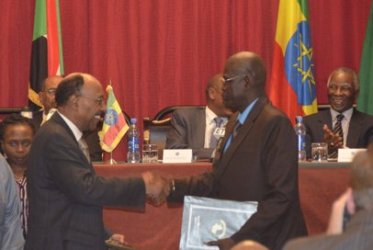Juba refusing to implement buffer zone, says Sudan defence minister
November 5, 2014 (KHARTOUM) – Sudan’s defence minister, Abdel-Rahim Mohamed Hussein, said South Sudan has refused to establish the Safe Demilitarised Border Zone (SDBZ), hampering the implementation of the signed security agreement

The purpose of the joint border verification mission is to prevent cross border attacks by rebel from both sides. The mission also has to investigate allegations of support to rebel groups.
Hussein, who met with the head of the African Union High Implementation Panel (AUHIP), Thabo Mbeki, said he briefed the latter on the latest developments in relations, stressing that Juba has not implemented the nine cooperation agreements signed between the two countries.
He told the official news agency SUNA that South Sudan refuses to determine the baseline for the demilitarised security zone (centre line) between the two countries, saying that implementation of the other agreements depends on drawing the centre line.
In September 2012, both Sudan and South Sudan signed a series of cooperation agreements, which covered oil, citizenship rights, security issues, banking, border trade among others.
In March 2013, the two countries signed an implementation matrix for these cooperation agreements.
Hussein pointed that the United Nations issued a resolution on 14 October holding South Sudan responsible for holding up demarcation of the temporary line between the two countries.
He underscored Sudan’s readiness to implement all cooperation agreements, expressing hope that Mbeki’s efforts for the implementation of the agreements succeed.
The defence minister further stressed Sudan’s keenness on stability of humanitarian situation in South Sudan, pointing to the influx of refugees who arrived in Sudan due to the ongoing conflict in South Sudan.
“We are making efforts to stop the war in the south,” he added.
He said the main objective of the next meeting of the Joint Political and Security Committee (JPSC) should be the determination of the centre line besides activation of the mechanisms agreed upon between the two countries.
On Tuesday, South Sudan’s president, Salva Kiir, discussed with his Sudanese counterpart, Omer Hassan al-Bashir in Khartoum the outstanding issues between the two nations.
According to the closing statement of the talks, the two presidents instructed the joint committees to immediately meet to resume implementation of the cooperation agreement and submit their reports to presidential summit through the joint higher committee.
The statement also mentioned that the JPSC will meet during this month to activate implementation of the security arrangement agreement and determine the zero line according to the AUHIP plan.
It also pointed to the activation of the mechanisms agreed upon to stop support and harbour rebel groups on both sides in preparation for the opening of the 10 border crossings between the two countries.
(ST)
